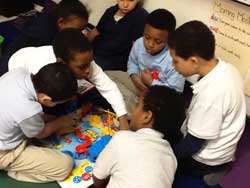A substantially separate classroom, also known as self-contained classroom, is a classroom environment outside of the general education setting for children with significant learning needs. These classrooms serve students who require a highly modified curriculum, smaller class size, and a lower student/teacher ratio. At the FMA there are five separate classrooms for children with autism spectrum disorders. Like the general education students, individuals in self-contained classrooms learn academic skills (reading, writing, mathematics, science, and social studies). They also learn daily living skills (hand washing, shoe tying, etc.), communication skills (requesting, commenting, etc.), and social skills (turn taking, following directions, etc.). Students follow modified curriculum goals, which are aligned with the Massachusetts Curriculum Frameworks. Students in self-contained classrooms may also receive related services such as Occupational Therapy, Physical Therapy, and Speech and Language Therapy.
 In these self-contained classrooms at the FMA, classroom instruction is based on the principles of Applied Behavioral Analysis. Applied Behavior Analysis (ABA) is a systematic method of instruction that uses a series of prompts and positive reinforcement to generalize learned behaviors and reduce negative behaviors. Students are most successful when they are taught in small groups or individually within the substantially separate classroom.
In these self-contained classrooms at the FMA, classroom instruction is based on the principles of Applied Behavioral Analysis. Applied Behavior Analysis (ABA) is a systematic method of instruction that uses a series of prompts and positive reinforcement to generalize learned behaviors and reduce negative behaviors. Students are most successful when they are taught in small groups or individually within the substantially separate classroom.
At the FMA all students attend school-wide events, field trips, and social activities. Students are integrated with typically developing peers in general education classrooms during academic and social activities, as appropriate. There are also many opportunities for reverse inclusion, where typical peers come to the substantially separate classroom to interact, study and play with students with ASD.